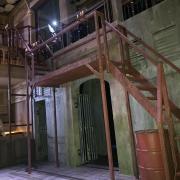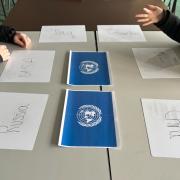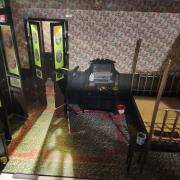
"We cannot understand [Fascism], but we can and must understand from where it springs, and we must be on our guard...because what happened can happen again...For this reason, it is everyone's duty to reflect on what happened."
~Primo Levi, Auschwitz survivor, scientist and writer
The 27th of January marked 75 years since the liberation of Auschwitz, and this imperative laid down by Primo Levi is still as relevant today. Historically and societally, Auschwitz represents not only the Nazi’s genocide of those they classified as "subhuman" but also the strength of the human spirit, which despite appalling conditions and adversity resisted the regime's attempts to suppress freedom and free thought and the extermination of entire races. A UNESCO World Heritage Centre , Auschwitz Birkenau's Universal Value (vi) is designated as a place of collective memory of this dark chapter in the history of humanity, of transmission to younger generations as a sign and warning of the many threats and tragic consequences of extreme ideologies and denial of human dignity. In her speech on the 75th Anniversary of the liberation of Auschwitz Audrey Azoulay Director-General of UNESCO defined it as our collective duty "to respond vigorously against the manipulation of culture and the instrumentalization of education, which is misused to indoctrinate or incite hatred, and to actively promote knowledge about other cultures and strengthen critical thinking and mutual respect."
Upon a visit to Auschwitz’s, one, regardless of their level of superstition, can certainly feel a sense of torture and torment. The sky in Poland, especially around this time of year, is grey and clouds obscure any of the hopeful blue, almost heightening the sense that one is in a nether world, and while the atrocities carried out here may have stopped 75 years ago, it is still a hellish place, and you get to see it. In one of the rooms you enter, behind a massive glass display, is a gigantic pile of hair, which was harvested by the Nazis from their victims, alongside their teeth. However, it is in the gas chamber that you really begin to feel the evil of this place. The second you walk in, the dull lighting and damp smell hit your body, your senses are instantly overwhelmed - you realise that where you’re standing is the same place that people stood and died, where countless of innocent people where slaughtered, and the number is unimaginable. Approximately 1.1 million were killed in Auschwitz. You find in the concentration camp massive untamed piles of belongings, such as numerous shoes, plates, combs, suitcases etc. It is in these belongings that one can even come close to understanding the scale of which these crimes were perpetrated, and on the walls you see pictures of just some of the victims. Not how they would want to be seen, not how they would want to be remembered, not how they would want history to immortalise them, as frail, thin, and bald. However, the very fact that one can’t comprehend the numbers, but can see the faces is the point, it’s why Auschwitz Birkenau was turned into a Museum, these people were not numbers, they were humans. By exterminating people on an industrial scale, the Nazi’s were intentionally dehumanising their victims, labelling as just numbers, just as 1.1 million lifeless figures. The Museum aims to rehumanise the victims, you get to see their faces and read their names, and suddenly they stop being a figure, they stop being a number, and they begin to become a person, like you or I. Most shocking of all, is that the perpetrators of these actions, were also regular people. They were not all psychopaths as popular culture would have you believe, they were normal people following orders, and that of course doesn’t excuse them of their crimes (although only roughly 1% actually faced any repercussion for their actions), but rather accentuates the terrifying truth of the Holocaust; humanity, anyone of us, could have committed these crimes, could have done unspeakable things to each other.
To some extent, that hasn’t changed. Genocides occurring in the present day continue to garner little to no media coverage, as if yet again international news cycles are either too preoccupied or perhaps too ashamed to investigate what humanity is capable of doing on such a mass scale. For example the Chinese government are currently detaining more than three million of the Uighur population of Muslims residing in China’s Xinjiang province, in what the authorities are labeling “re-education” programs, which include forced abortions and rumoured to be conducting a lucrative and illegal trade in vital organs to wealthy Arab nations. Much like the Nazi regime, the genocide was partaken on a mass scale, but not just for cultural reasons of hatred, but for economic reasons. For the Nazi regime it was creating living space (Lebensraum), and they used the hair and teeth of their victims for industry, and we unfortunately can see history repeat itself in terms of the rumored organ trade in China.
Precipitated by the 1st decade of the Millennium's global recession combined with burgeoning humanitarian crises, ongoing economic and social resentments and resurgent racist tribalism, liberal democracy is in crisis. The rise of populism, accession to power of purported anti-elite, authoritarian and nativist leaders, political parties demonstrating extremist views garnering an expanded share of the vote and widespread promulgation of xenophobic, dehumanizing, demonizing blaming and "othering" of ethnic and other minorities. (eg. President Trump’s villianisation of Mexicans, David Cameron's "swarms" of migrants or our current Prime Minister's depictions of Africans and Muslim women) has fueled rebellion against the liberal democratic order and the rule of law perpetrating deliberate interference to the International communities' capacity to maintain functioning tolerant pluralistic societies resistant to the divisive temptations of ethnonationalism (eg. in 2019 the human rights organisation Freedom House downgraded Hungary to the status of "partly free") . Accounting for, Yale historian Prof. Timothy Snyder (a specialist in the history of Central and Eastern Europe, and the Holocaust) worries that the history of the Holocaust has lost some sharpness of focus, becoming less about investigation of causes, and more about pictures, remembering and honoring. “What honoring leads to is a lot of respectful silence. That has its place, but it doesn’t generate knowledge."
As her 1st legislative act in October 2019, Primo Levi's fellow Auschwitz survivor Senator for Life Liliana Segre, one of only 35 of the 776 Italian children aged 14 or younger deported to Auschwitz to have survived (it is believed 8,000 Italian Jews died in Nazi camps) proposed the establishment of a Parliamentary Control Commission on all kinds of racism, anti-Semitism and incitement to hatred and violence on racial or religious grounds. Despite abstentions by right wing and anti immigrant parties such as Matteo Salvini's Lega the passing of the motion precipitated a deluge of up to 200 a day anti-Semitic, hate messages and death threats addressed to the elderly Senator prompting the Prefect of her home city of Milan to assign her police protection. Three-quarters of a century after the Holocaust there are apparently still those who want to take her life, and who, to some degree have managed to curtail her freedom as she commemorates the 75th anniversary of the liberation of Auschwitz under police guard. Published in the week marking the Anniversary of Auschwitz's liberation, Italy's independent social, economic and political research institute Eurispes' 36th annual report found that more than 15% of respondents believe the Holocaust never occurred (5 times higher than a 2004 poll), while 60.6% believe recent episodes of Antisemitism to be the consequence of a widespread language based on hatred and racism and a little less than half (47.5%) believe such anti-Semititic acts signify a dangerous upsurge of the phenomenon.-"If not fought against " as Orwell alerts us in the last line of his last public statement about his final book "Totalitarianism could triumph anywhere."
“Anywhere” - seemingly even the streets of London are not safe, as two businesses in Blackheath and Greenwich were vandalised on the 26th of January, with graffiti of Swastikas, the Star of David, and anti-Semitic comments. This incident came a month after a synagogue wall and shop window in North London were found covered in a red Star of David alongside a reference to the 9/11 terrorist attacks. This is just a reminder that the culture of hatred did not end with the liberation of Auschwitz 75 years ago, it permeates our societies, it creeps into the workings of countries internationally, and at home. It seemingly burrows into the very fabric of our communities and seeks to turn neighbour against neighbour, man on man, humanity on itself. And it is a sorry, sorry thing to see now 75 years later, because we have unfortunately seen it all before. On one of the walls of Auschwitz, they have written up both in Polish and English, the famous quote by George Santayana, which has produced many variants, “ those who cannot remember the past are condemned to repeat it.”

































